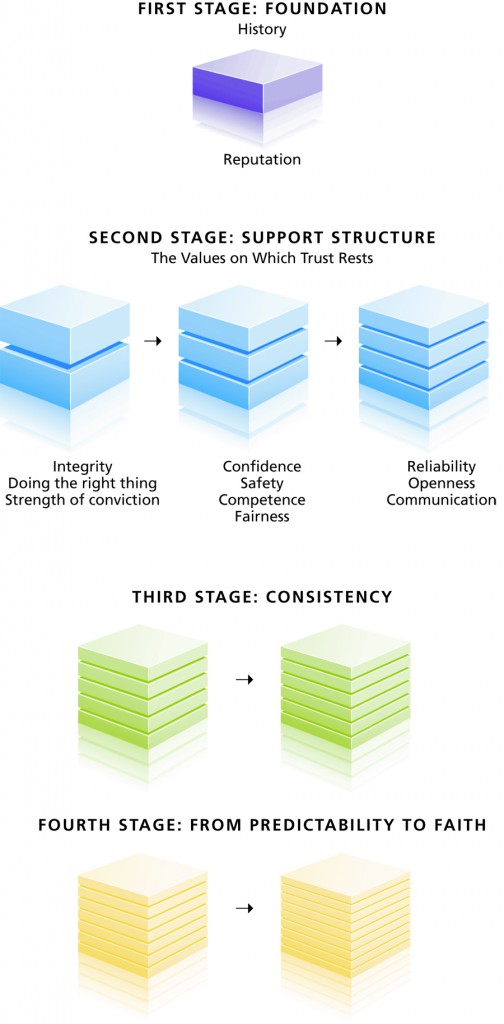There’s nothing more important than creating trust. Trust is the fabric that binds us together, creating an orderly, civilized society from chaos and anarchy. Trust is not an abstract, theoretical, idealistic goal forever beyond our reach. Trust –– or lack of it –– is inherent in every action that we take and affects everything that we do. Trust is the cement that binds relationships, keeping spouses together, business deals intact, and political systems stable. Without trust, marriages fails, voters become apathetic, and organizations flounder. Creating trust is vital. Without trust, no company can ever hope for excellence.
Understanding the meaning of trust allows you to work toward being a trusted and trusting person. The truth is that trust is never guaranteed, and it can’t be won overnight. Trust must be carefully constructed, vigorously nurtured, and constantly reinforced. Trust is established over time, gradually, through a long chain of successful experiences. In the early stages of relationships, whether personal or business, we extend ourselves in small ways and observe the responses to our actions. Then we take appropriate action, withdrawing, maintaining our behavior, or extending ourselves a bit further each time until trust is established. Although trust takes a long time to develop, it can be destroyed by a single action. Moreover, once lost, it is very difficult to re-establish.
Creating trusting relationships is a process that can best be described as stacking layers on a foundation one at a time in such a way that each layer bonds on top of the prior one before another layer is added.
In a world where time is a precious resource, where we must often move without having the time to explore all the options, we use shortcuts to circumvent the process. For this reason, an individual’s or organization’s history or track record is often evaluated to gauge how we may be treated in a relationship.
Creating Trust: First stage
Foundation
The foundation, or first stage, represents the beginning of a relationship and depicts the history of those involved. We generally start off with some preconceived notion about others. We meet and develop first impressions about people through the friends we have in common; watching how they treat others; the things they talk about in meetings, while commuting, at parties; and general observations during work. We develop first impressions of companies by seeing an advertisement, getting references from people, or reading articles about them on the Internet.
Creating Trust: Second stage
Support structure | The values on which trust rests
The second stage represents values that lead to trusting relationships, such as integrity, reliability, and openness. Once these characteristics are demonstrated, they form the support structure of a trusting relationship. When these actions are repeated time and time again, the relationship is strengthened and becomes part of the framework of the next phase.
Creating Trust: Third stage
Consistency
The third stage, consistency, enables us to anticipate probable actions. It provides a certain degree of comfort that helps us to maintain the relationship even through difficult times.
Creating Trust: Fourth stage
From predictability to faith
The fourth stage is faith––as these layers are stacked on top of the other three stages, everything that came before them strengthens the framework. This is the stage at which actions are so predictable that we don’t consciously have to think about the relationship. At this phase, trust has become so integral a part of the relationship that we expect it to work. At their peak, relationships imbued with trust are bonded together by a faith so strong that it is very difficult to destroy the relationship. It is at this stage that people allow themselves to become entirely vulnerable to others.
In our next post, we’ll hone in on Phase One: “How To Build Trust: Creating the Foundation.”
Additional Reading:
How To Build Trust: Creating the Foundation
The Values on Which Trust Rests
Trust: How to Earn Someone’s Faith
Trust Me: 55 Ways to Build Trust and Credibility
If you like this article, subscribe to our blog so that you don’t miss a single post. Get future posts by RSS feed, email or Facebook. It’s FREE. Click your favorite option (top right).







Hey Frank,
This is great! I love the visuals here. It’s a process. Trust, like reputation, is something you can’t build over night or throw money at. It’s quick to loose as well.
Consistency is tough.
Thanks!
-Dan Fonseca
Hi Dan
Thanks for dropping by. It’s great hearing from you.
I’m so glad that you honed in on the importance of consistency. Trust takes a long time to build, but it can be lost in the blink of an eye. In order for someone to be predictable (and gain someone’s faith) their words AND actions must be consistent.
Have a great day!
Best,
Frank
Hi. This article was very well explained trust as a process and for sure each stages are needed. Howerver, I think one important element is still missing in the stage two and that is capability. It means that how much you are also capable to do what you are supposed to do is playing a crucial role in trust. This is where personal skills and ability to do the job will become important. You need to have or aquire certain skills to give confident to people around you the you can do what you haved asked for.
Hi Farnaz
You’re absolutely right–capability is key.
I call this area “competence”. As you say, trust is increased when an individual is believed to be competent. I’ll have more to say about this when we discuss the second stage of the model in greater depth. Thanks again for visiting my blog and for providing your thoughts.
Have a wonderful day!
Best,
Frank
Really well-done, Frank. A great model that I am eager to read more about as it unfolds. I am particularly interested in the Consistency stage, as this is where it all really comes together around trust (in my opinion). Great work! Jon
Hi Jon
Great to see you here. I also believe that consistency is key. It’s important to make a conscious effort in the beginning, but it’s a lot easier once you develop good habits.
This is as good a time as any to say that I’m a BIG fan of your work. I encourage everyone to read your blog. http://www.thindifference.com/
Have a super day!
Best,
Frank
Trust is the most important thing in building a business.Those who cannot trust themselves cannot trust any body else.I think,this happens because the emotion is doing the thinking.for most people….thanks for your great tips…God bless you…let’s make the world more and more beautiful…
Hi Santhosh
Thanks for your kind words. I appreciate it more than you’ll ever know.
I absolutely agree that trust is critical in business. I’m always fond of saying that without trust, no company can hope for excellence.
Have a great day!
Best,
Frank
thank you
I don’t think we can be reminded enough about the importance of trust and what we can do to keep building it. It is a strong human currency!
Hi Jayne
Thanks for dropping by.
I’m so glad that you recognize the importance of trust. Unfortunately, some people take important things in life for granted. Then, they’re surprised when they lose it.
The mission of this blog is to highlight the urgent need to reawaken personal values and personal responsibility. Thank you for helping us spread the word.
Have a wonderful day!
Best,
Frank
Great Post and infographic! When I speak about trust I always say that at the heart of every transaction is TRUST.
Now there’s a really big gap between someone being aware of you (which is really hard) and someone trusting you, enough to invest you or buy from you.
Patrick
You’re absolutely right. There’s a HUGE difference between visibility and trust. While visibility may get you in the door, trust is what secures the relationship.
It’s too bad that trust doesn’t get the emphasis that it deserves. One reason is that trust is intangible –– and difficult to quantify. We have to change that.
Have a great day!
Frank
How would you suggest or apply this to a relationship, where, trust was once broken, and is now trying to be rebuilt? Eg. Partner 1 was unfaithful, swore never to do it again, and has made some positive changes, but is lacking the tools to show and earn trust back. Partner 2 is very hurt, anxious and is still having some doubts, wants to believe and trust again, but perhaps does not recognise the stages or signs of the trust trying to be rebuilt?
Hi Jess
There’s no easy answer to your question. Some people think saying, “sorry” will cure all ills. The truth is that trust can’t be turned off and on like a light switch. Trust takes takes time and energy to build and double the effort to rebuild. It won’t be the result of saying or doing one big thing, but rather the result of many small things over time.
If you’re having a hard time discussing your feelings with each other you may want to seek a counselor for support.
I listed the building blocks of trust in “The Values on Which Trust Rests.” https://www.franksonnebergonline.com/trust-and-integrity/the-values-on-which-trust-rests/
I wish both of you well.
Frank
Hi Frank,
you did a wonderful work with this model here …
I only ask me now, why exactly “Reputation” is the basis …
You explain, that we develop first impressions of people, of companies, …
We certainly do that …
We, no question, watch what kind of reputation people, companies and brands have …and we decide whether to trust or not…
First impressions do not make a reputation ….
I would rather choose the word “Personality” for the Foundation.
First impressions result from the own personality.
How we behave, how we present us, how we talk, how we communicate … and much more.
This is the own personality, not the reputation.
One day we have a good reputation …
Send you my best regards
Karin
http://www.karinsebelin.com
Hi Karin
The adage, “Your reputation precedes you” means that people have heard about you or your organization, and built an impression, before a meeting ever takes place. Consequently, reputation represents the first stage of the trust model.
A preconceived notion can work for or against you, resulting in a positive or negative impact on trust.
Thanks for taking the time to write.
Best,
Frank
Hi Frank,
thank you for taking the time to write back …
Reputation is, for sure, very important, when we want to achieve trust.
I just thought, it is only bad when we seek to achieve too much influence and attention.
There is a wonderful quote that describes this well:
“TOO MANY PEOPLE OVERVALUE WHAT THEY ARE NOT AND UNDERVALUE WHAT THEY ARE.”
(Malcolm Forbes)
Our qualities must be connected with our brand, with our character and with our attitude, with our competency and with our integrity, with our credibility and with trust, that reputation can be extended.
I believe, you see it that way, too, Frank.
We should align our values with our brand, with our personality.
Only then, a good reputation can follow.
Good that we can discuss such interesting topics together … only through discussions and experiences with others, through hearing and trying to understand other viewpoints, we learn and extend the own horizon and expertise …
Send you my best regards,
Karin
Hi Karin
I feel that too many people focus on managing their reputation rather than living with honor and integrity.
If you have strong moral character and make ourself proud, you don’t have to worry about your reputation. It’ll take care of itself.
Thanks for taking the time to write.
Best,
Frank